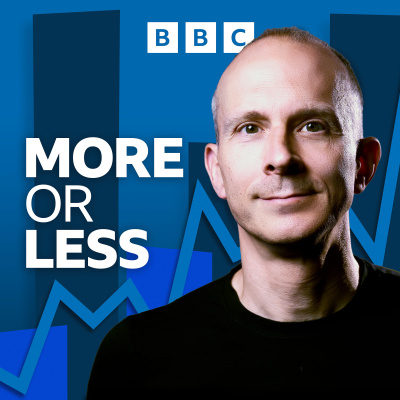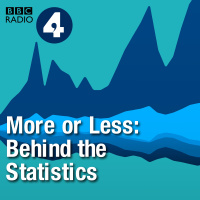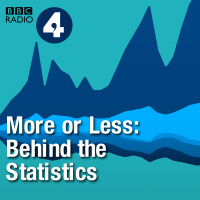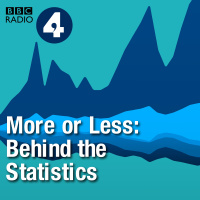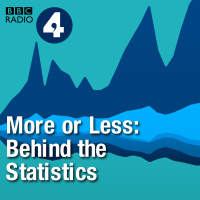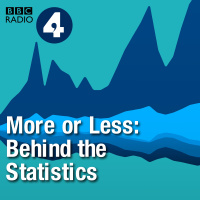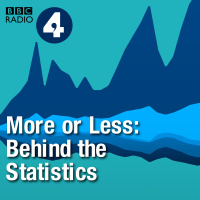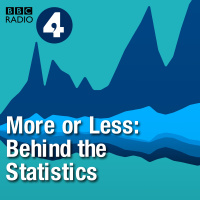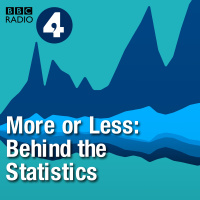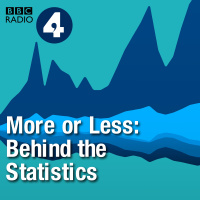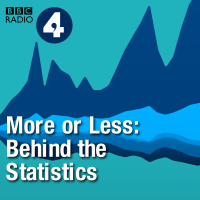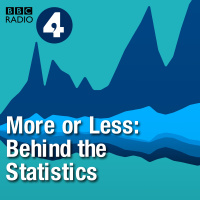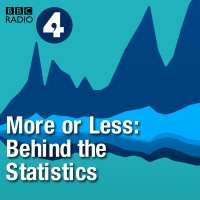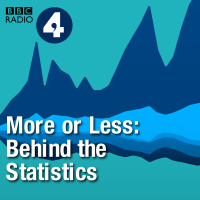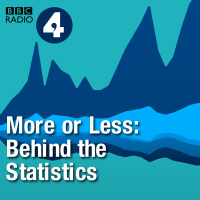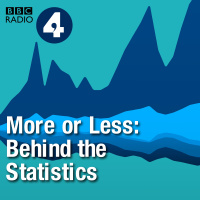Synopsis
Tim Harford and the More or Less team try to make sense of the statistics which surround us. From BBC Radio 4
Episodes
-
WS MoreOrLess: Genocide in South Africa?
14/12/2013 Duration: 09minIt is claimed white South Africans are being systematically killed because of the colour of their skin, but do the crime statistics back this up? No, explains Julian Rademeyer from Africa Check and Johan Burger from the Institute of Security Studies in Pretoria. Presenter: Ruth Alexander. This programme was first broadcast on the BBC World Service.
-
WS MoreOrLess: Testing the PISA test
07/12/2013 Duration: 09minThe publication of the latest international education league table has created waves around the world. From Shanghai at the top of the table to Peru at the bottom, the PISA rankings create a lot of discussion about the best way to teach children. In some countries the OECD-led ratings are taken so seriously that education policy has been changed to try to improve national performance. But is the league table really as definitive as many people believe? Ruth Alexander looks behind the numbers. Presenter/producer: Ruth Alexander This programme was first broadcast on the BBC World Service.
-
Football Ranking Mysteries Explained
30/11/2013 Duration: 09minAhead of the 2014 World Cup draw next Friday, we look at world football rankings. How are Switzerland seeded when the Netherlands, Italy and England are not? The answer lies in the playing of friendly games, which can be incredibly unfriendly to your ranking if you play the wrong team at the wrong time. This programme was first broadcast on the BBC World Service.
-
WS MoreOrLess: Could statistics cure cancer?
23/11/2013 Duration: 09minRuth Alexander speaks to a statistician at the forefront of cancer research, Professor Terry Speed. He has just been awarded the Prime Minister’s Prize for Science in Australia. This programme was first broadcast on the BBC World Service.
-
WS MoreOrLess: Sachin Tendulkar - best batsman of all time?
16/11/2013 Duration: 09minSachin Ramesh Tendulkar has amassed 15,847 test runs, which is 2,500 more runs than any other batsman. But other ways have been devised to calculate cricketing greatness and the Little Master, as he has become known, does not feature as prominently in a lot of them. More or Less crunches the numbers. This programme was first broadcast on the BBC World Service.
-
WS MoreOrLess: Does politics make us get our sums wrong?
09/11/2013 Duration: 09minTo what degree do our personal opinions cloud our judgement? Yale University researchers have attempted to detect and measure how our political beliefs affect our ability to make rational decisions. The study suggests that our ability to do maths plummets when we are looking at data which clashes with our worldview. Ruth Alexander and Ben Carter consider Professor Dan Kahan's findings. This programme was first broadcast on the BBC World Service.
-
100,000 Christian martyrs?
02/11/2013 Duration: 09minIt is claimed an average of 100,000 Christians have died because of their faith every year for the past decade: and that this is an 'unreported catastrophe'. The Vatican has called it a credible number. But is it? Ruth Alexander and Wesley Stephenson report.
-
WS MoreOrLess: Fertility - when is too late?
26/10/2013 Duration: 09minWomen in their late thirties shouldn’t be as anxious about their prospects of having a baby as is commonly assumed, psychologist Jean Twenge argues. Tim Harford finds fertility experts agree. This programme was first broadcast on the BBC World Service.
-
WS MoreOrLess: Nobel Prize puzzle
19/10/2013 Duration: 09minTim Harford tells the story of how two economists who disagree with each other have been jointly awarded the Nobel Prize. Eugene Fama has shown that stock markets are efficient, while Robert Shiller has shown that they're not. Tim interviews both professors about their findings, and this apparent contradiction.
-
The Hawthorne Effect
12/10/2013 Duration: 09minTim Harford tells the story of the Hawthorne Experiments, one of the most famous social studies of the Twentieth Century. The finding – that workers are more productive if they are given attention - became known as the Hawthorne Effect. And he hears how the original data are now casting doubt on the legendary results. This programme was first broadcast on the BBC World Service.
-
WS MoreOrLess: Mosquitoes and elephants
07/10/2013 Duration: 09minHas the mosquito killed half the people who have ever lived? Tim Harford assesses the claim. Are 96 elephants a day being killed in Africa? Plus, a return to the subject of left-handers – could it be true that they're more likely to be criminal masterminds? This programme was first broadcast on the BBC World Service.
-
Underage drinking
04/10/2013 Duration: 27minAre hundreds of young children visiting A&E because of alcohol? Plus, an update on the Trumptonshire economy. And has the mosquito killed half the people who have ever lived? Tim Harford presents.
-
WS MoreOrLess: Population explosion?
30/09/2013 Duration: 09min"We just shut our eyes to the fact that the world's population is increasing out of control." Is broadcaster and naturalist Sir David Attenborough right about global population projections? And Tim Harford wonders whether it's true that Scotland is home to 20% of the world's redheads. This programme was first broadcast on the BBC World Service.
-
NHS hospital deaths
27/09/2013 Duration: 28minTim Harford examines the claim that NHS hospital patients are 45% more likely to die than US ones. Is Sir David Attenborough right that the world's population is increasingly out of control? And are 20% of the world's redheads in Scotland? Plus, the story of the Hawthorne Experiment, one of the most famous studies in industrial history.
-
Formula 1 racing risk
23/09/2013 Duration: 09min'I accept every time I get in my car, there's a 20% chance I could die'. It's a line from the Formula 1 hit film, Rush. Spoken by racing driver Niki Lauda's character. Formula 1 was certainly a dangerous sport during the 1970s, but was it really that dangerous? Tim Harford and Hannah Barnes look at the data. Plus, is it true that it takes 1,000 years for a plastic bag to degrade? It's a popular claim, but More or Less finds the environmental facts about plastic bags are much less certain than that statistic suggests. This edition was first broadcast on the BBC World Service.
-
Do free school meals work?
20/09/2013 Duration: 28minAll pupils at infant schools in England are to get free school lunches from next September, but does the evidence prove free dinners improve results? 'I accept every time I get in my car, there's a 20% chance I could die' - it's a line from the Formula 1 hit film, Rush, but was it really true for 1970s racing drivers? The government wants shops to start charging for plastic bags and the Deputy Prime Minister Nick Clegg says a plastic bag takes 1,000 years to degrade, but More or Less finds the environmental facts about plastic bags are much less certain than that statistic suggests. And do the health benefits of cycling outweigh the risk of injury? Professor David Spiegelhalter goes through the numbers.
-
Sexual violence statistics in Asia
16/09/2013 Duration: 09minAlmost a quarter of men in some Asian countries admit rape, it has been reported. The headlines have been sparked by a UN report, which looks at violence against women in parts of Asia. Are the numbers of rapists really this high? Tim Harford and Ruth Alexander look into the detail of the study. And, “Africa has a drinking problem” - so says Time Magazine. More or Less discovers a more mixed picture. This programme was first broadcast on the BBC World Service.
-
Fertility: when is too late?
13/09/2013 Duration: 28minPsychologist Jean Twenge argues that women in their late thirties shouldn’t be as anxious about their prospects of having a baby as is commonly assumed. Tim Harford finds fertility experts agree. The economy’s turning a corner, the Chancellor says - Tim Harford takes a closer look at the numbers. Plus, sexual violence statistics in Asia; Britain’s ‘small island’ status rebutted; and does Africa really have a ‘drinking problem’? This is the edition of the programme first broadcast on BBC Radio 4.
-
The death toll in Syria
09/09/2013 Duration: 09minAs global leaders remain divided on whether to carry out a military strike against Syria in response to the apparent use of chemical weapons against its people, Tim Harford looks at the different claims made about how many people have been killed. And, apparently, it's a fact that if there's one thing that's worse for you than drinking, scoffing bacon sandwiches and smoking 80 unfiltered cigarettes a day, it's being left-handed. Left-handers die on average several years earlier than right-handers. Or do they? Tim gets to the bottom of a sinister statistic. This edition was first broadcast on the BBC World Service.
-
The Death Toll in Syria
06/09/2013 Duration: 28minTim Harford looks at the different claims made about how many people have been killed in the apparent chemical attack in Syria. The cost of care has forced a million families to sell their homes in the past five years, it’s been reported – but is it true? What can statistics tell us about the safety of Super Puma helicopters? Tim finds out whether left-handers really die nine years earlier than right-handers. And, he assesses the facts behind the claim that 300,000 attempts have been made to access pornographic websites at Parliament in a year.
